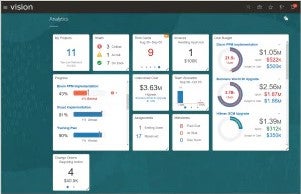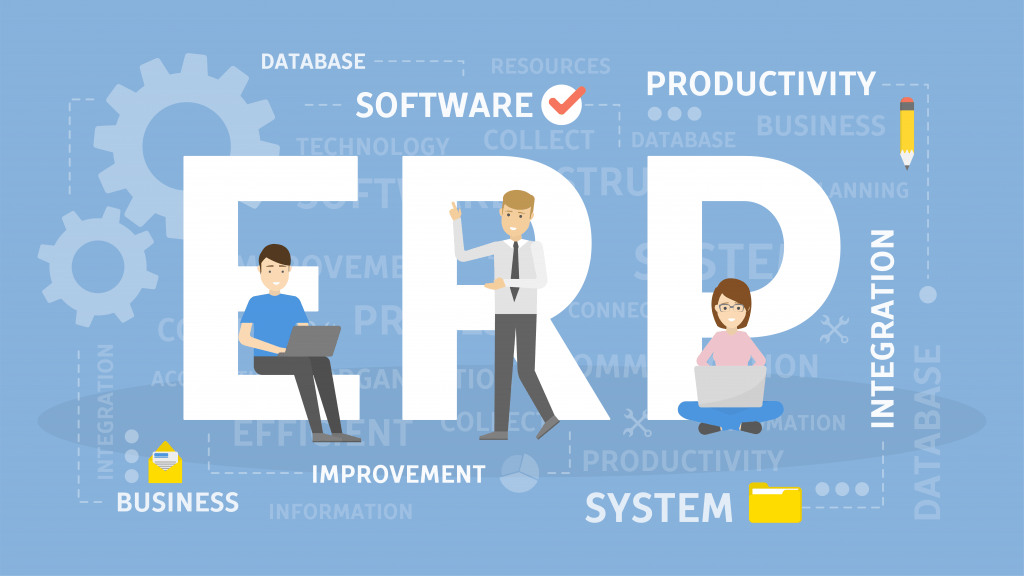
Choosing the right enterprise resource planning (ERP) software is easily one of the most important and difficult choices a buying team has to make.
Oracle and SAP are two of the biggest, most well-known names in the ERP software space. Each vendor is better suited for some business needs over others, so keep your business’s unique needs in mind while comparing Oracle and SAP features.
Read more: Three Key Advances in ERP for 2021
What is Oracle ERP?
Oracle ERP is a cloud-based, fully integrated, and comprehensive business management platform. It’s designed to assist with streamlined processes, automated tasks, efficient and collaborative work on ledgers, payables and assets, receivables, collections, expenses, and more.
With Oracle ERP, management can oversee accounting, financials, planning and procurement, project management, reporting, supply chain operations, and more, all from a single platform.
Key features
- Multi-dimensional, self-serve reporting
- Collaboration
- Average daily balances
- Daily transactions
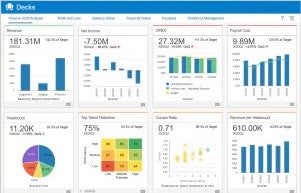
Oracle ERP empowers employees to monitor and address concerns with self-service reporting capabilities drawn from real-time data. It also reduces complexity by facilitating collaboration and automating processes such as file updates.
What is SAP ERP?
SAP S/4HANA is a comprehensive, cloud-based ERP platform that runs core departmental processes in a single system. Areas include but are not limited to finance, manufacturing, HR, supply chain, services, and procurement.
Organizations utilizing SAP S/4HANA ERP benefit from its integration between processes and a consistent, in-memory data model. With built-in intelligent technologies—including AI, machine learning, and advanced analytics—SAP ERP offers a number of advantages. For example, companies can manage rapid business change, orchestrate internal and external resources, and use the predictive power of AI to plan for future ebbs and flows in production or assess profit and margin contribution.
Read more: SAP ERP Software: S/4 HANA Cloud Review for 2022
Key features
- Optimized production processes via scheduled equipment maintenance
- Integrated information between production, quality, and costs
- Revenue stream tracking from order to cash
- Sales target and performance monitoring
- Materials and inventory planning
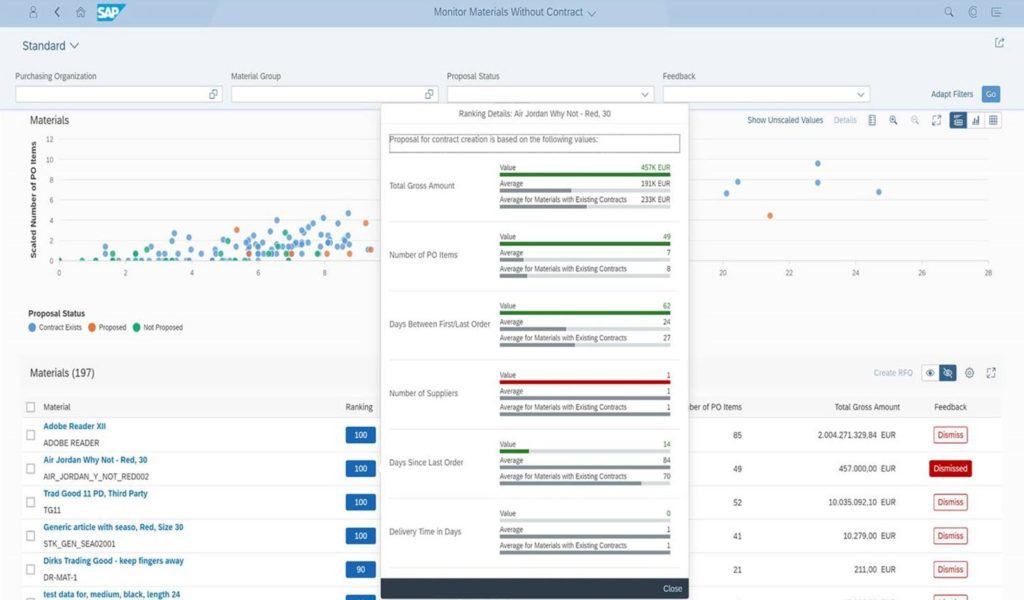
SAP’s ERP empowers companies of all sizes to stay on the cutting edge with continuous updates, easy scalability, and cost efficiency.
Comparing Oracle and SAP offerings
Oracle and SAP each have something to offer when it comes to AI, customizability, security, and pricing.
Oracle vs SAP: AI
Oracle and SAP both offer AI functionality to increase efficiency and leverage business intelligence to drive your company forward.
Oracle’s built-in, AI-powered features help businesses meet increased demand for personalization and enhance a wide range of business processes.
AI enhances SuiteBilling, the financial services module in Oracle. Suitebilling features revenue recognition, the ability to carry out transactions across currencies, and predictive analytics. Within the financial services module of Oracle’s ERP, users can also test out hypothetical scenarios and their financial impact on business.
Chatbots are yet another way that AI infuses Oracle’s ERP offering, serving as a smart interface between users and the back-office information they seek.
SAP also incorporates AI in its product, particularly for managing invoices and purchase orders that inform how financial statements get generated. This reduces manual data entry and saves time by identifying and resolving discrepancies. SAP likewise has integrated a chatbot function, the CoPilot tool, as part of its broader Conversational AI service. CoPilot uses natural language processing to direct users to the information they’re searching for based on language input in their query.
Oracle vs SAP: Customizability
Oracle offers extensibility through add-on modules like financials, procurement, project management, and more. Starting with provided templates, users can customize them to fit their departmental needs.
The SuiteBilling module features customizable analytics and dashboards. The more tech-savvy users can even code their own solutions into any of the modules. However, smaller companies should beware that customization comes with a hefty price tag and presents a formidable barrier to adopting Oracle’s Cloud ERP software.
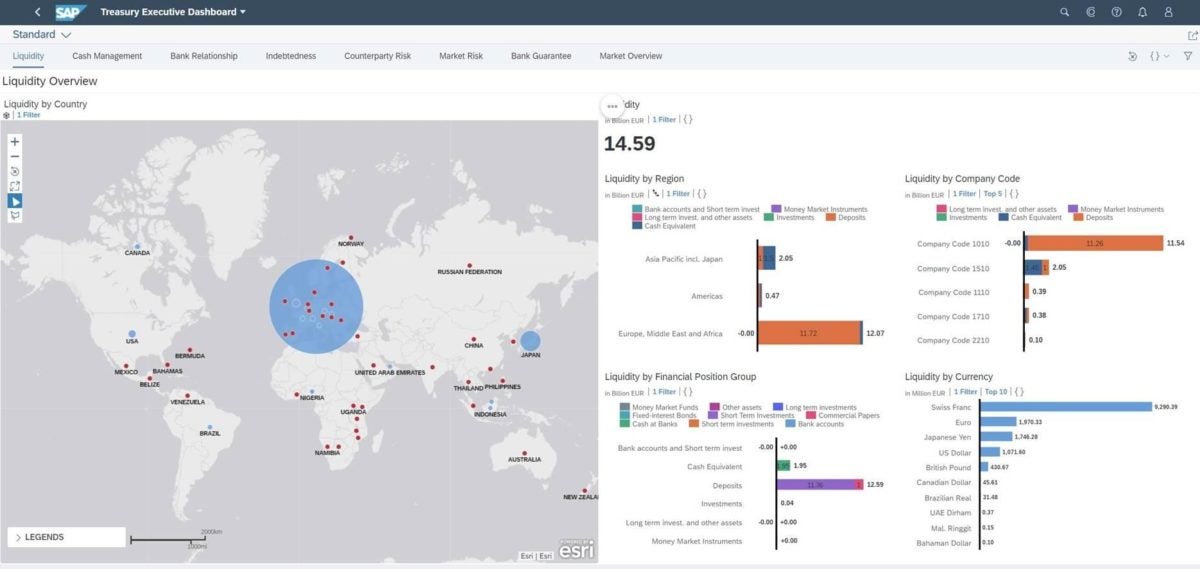
Oracle vs SAP: Security
Oracle’s cloud infrastructure is designed with security as a priority. Oracle’s cloud ERP protects customer data through isolated network virtualization, highly secure firmware installation, a controlled physical network, and network segmentation. It also ensures secure connectivity through least privilege access, multiple authentication layers, encrypted internal WAN connections, and secure external connections via secure VPN, which is useful for today’s remote workers.
Read more: VPNs, Zero Trust Network Access, and Evolution of Secure Remote Work
SAP utilizes an advanced technology infrastructure that delivers continuous updates to the platform through the cloud. In addition, SAP security experts manage data protection and address security threats which enhances customers’ internal SecOps teams and gives CISOs peace of mind. With powerful infrastructure and a dedicated team of security experts, users can be rest assured that their data is in good hands.
Oracle vs SAP: Pricing
Oracle does not display pricing information publicly, requiring prospective customers to contact sales for a custom quote.
However, based on enterprise customers’ reviews, Oracle’s ERP offering is about 10 percent more expensive than alternatives. Small and medium-sized customers report Oracle’s ERP system being 30 and 37 percent more expensive, respectively.
After a free 14-day trial SAP S/4HANA’s one of three pricing models kicks in, based on what you choose: pay per module, pay per user, or via license.
Is Oracle or SAP the better ERP System?
Choose ERP software carefully, as it will manage most of your company’s data. ERP software also demands a considerable financial and time investment for purchasing and implementation.
Ask the ERP vendor about integrations, data migration, and training support. Implementation support may come at an additional cost. Alternatively, a vendor may be able to suggest third-party consultancy firms that can provide virtual or on-site training.
For companies looking for a build-as-you-grow type of ERP, Oracle is a better choice, since it offers a wide array of optional plug-ins. However, beware of growing cost with each additional add-on. SAP offers a more comprehensive package from the start, making it a great choice for companies that are ready to commit to a broader platform.
Depending on your company’s current security model, you may desire an extension of your SecOps team. In that case, SAP is the better bet, as its security experts help manage and optimize ERP security. Oracle, on the other hand, is more tool-based, including built-in security features within its ERP.
Still not sure which vendor is right for your business? Compare Oracle and SAP with other providers on our list of Best ERP Systems for 2022.
